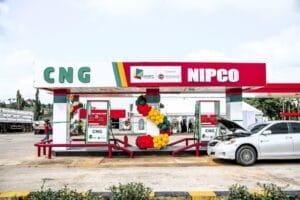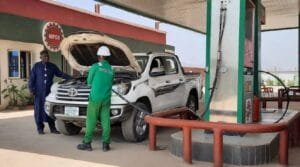Looking to switch from petrol to a more affordable and eco-friendly fuel? Explore the updated NIPCO CNG conversion price in Nigeria, the benefits of using Compressed Natural Gas, disadvantages, FAQs, and all you need to know to make an informed decision.
With the rising cost of petrol in Nigeria now ranging between ₦890 and ₦990 per litre, many car owners are desperately searching for affordable alternatives. One increasingly popular solution is converting petrol engines to run on Compressed Natural Gas (CNG). Among the leading players in this sector is NIPCO Gas Limited, a pioneer in bringing CNG infrastructure and services to Nigerian roads.
As part of the Presidential CNG Initiative, NIPCO is actively supporting the federal government’s goal of reducing reliance on imported petrol by helping individuals and fleet operators switch to CNG. But how much does it really cost to convert your vehicle? What are the pros and cons? Is it worth it?
This blog post breaks it all down for you, from CNG conversion prices in Nigeria, key benefits, and drawbacks, to the types of CNG kits, locations, safety tips, and real savings. Whether you’re a private car owner or commercial driver, this is your complete guide to NIPCO’s CNG conversion program.
🔍 Quick Overview: NIPCO CNG Conversion in Nigeria
| Feature | Details |
|---|---|
| Conversion Cost | ₦280,000 – ₦750,000 (depends on vehicle type & cylinder size) |
| Cylinder Sizes Available | 12kg, 25kg, 50kg, 70kg |
| Fuel Cost Savings | Up to 60% compared to petrol |
| CNG Price per Kg | ₦200 – ₦280 |
| Conversion Time | 4 to 6 hours |
| CNG Stations (NIPCO) | Lagos, Abuja, Ogun, Edo, Rivers, Kaduna, Delta |
| Dual-Fuel Feature | Yes (switch between petrol and CNG) |
| Government Support | Yes (under Presidential CNG Initiative) |
| Environmental Impact | Low emissions, cleaner air |
✅ Key Takeaways
Fuel Savings: You can save up to ₦400+ per litre by switching to CNG.
Eco-Friendly Option: Reduced CO2 and harmful emissions from your vehicle.
Safe & Dual Fuel: Continue using petrol when CNG isn’t available.
Affordable Conversion: Entry-level conversion kits start from ₦280,000.
Nationwide Growth: More CNG stations are planned across Nigeria by 2026.

💰 NIPCO CNG Conversion Price in Nigeria (2025 Update)
NIPCO Gas currently offers CNG conversion kits for different categories of vehicles, including commercial buses, tricycles (keke), and private cars. Prices vary depending on the engine capacity, type of cylinder, and kit configuration (single or dual fuel).
Price Range by Vehicle Type:
Tricycles (Keke Napep): ₦280,000 – ₦350,000
Small Cars (1.3L – 1.8L): ₦400,000 – ₦500,000
SUVs/High Capacity Cars: ₦550,000 – ₦750,000
Commercial Buses (Hiace): ₦600,000 – ₦750,000
Note: Prices include the CNG cylinder, pressure gauge, ECU, injector rail, and labour cost.
🌍 Benefits of CNG Vehicles in Nigeria
Switching to a CNG-powered vehicle in Nigeria offers multiple benefits, especially with the high price of petrol. Here’s how CNG can improve your vehicle experience and your pocket:
1. Massive Fuel Savings
CNG is significantly cheaper than petrol or diesel. At ₦200–₦280 per kilogram, you can cut your fuel cost by more than 60%, especially if you drive long distances or run a transport business.
2. Environmentally Friendly
CNG emits less carbon dioxide (CO2), carbon monoxide (CO), and nitrogen oxides (NOx) compared to petrol or diesel. This means cleaner air, reduced pollution, and a smaller carbon footprint.
3. Better Engine Life
CNG burns cleaner than petrol, reducing wear and tear on engine parts. You’ll spend less on maintenance and repairs in the long run.
4. Dual-Fuel Capability
Even after conversion, your vehicle can still run on petrol when CNG isn’t available. You’re never stuck without fuel.
5. Supported by Government
Through the Presidential CNG Initiative, the federal government is offering incentives and encouraging wide-scale adoption.
❌ Disadvantages of CNG Kits
While CNG conversion comes with exciting benefits, there are a few challenges to consider:
1. High Initial Cost
The upfront cost of installing a CNG kit can be ₦280,000 to ₦750,000, which might discourage some car owners, especially in low-income areas.
2. Limited Refueling Stations
While stations are growing in number, CNG outlets are not yet widespread in many parts of Nigeria, which may pose challenges during long-distance travel.
3. Reduced Boot Space
The CNG cylinder takes up space in your trunk, which may be inconvenient if you carry luggage or run logistics.
4. Slight Power Reduction
In some vehicles, engine power might drop slightly when running on CNG, although this can be managed with good maintenance.

🔧 Where to Get NIPCO CNG Conversion in Nigeria
NIPCO operates several certified CNG conversion centres across Nigeria. Here are the major cities where you can get reliable conversion services:
Lagos – Ibafo, Ikeja
Abuja – Lugbe, Gwagwalada
Ogun – Mowe, Sagamu
Edo – Benin City
Rivers – Port Harcourt
Kaduna
Delta – Warri
Visit their official site or check @nipcogas on Twitter for station updates.
🔄 Petrol vs. CNG: Cost Comparison
| Fuel Type | Cost Per Litre/Kg | Average Monthly Spend | Annual Cost (Est.) |
|---|---|---|---|
| Petrol | ₦890 – ₦990 | ₦50,000 – ₦150,000 | ₦600,000 – ₦1.8 million |
| CNG | ₦200 – ₦280 | ₦20,000 – ₦60,000 | ₦240,000 – ₦720,000 |
🛠️ What Is Included in the CNG Kit?
A typical NIPCO CNG conversion kit comes with:
CNG Cylinder (12–70kg)
Pressure Regulator & Valve
Injector Rail
ECU (Electronic Control Unit)
CNG Filter
Pressure Gauge
Manual/Automatic Fuel Selector Switch
Labour & Installation
🔐 Is CNG Safe in Nigeria?
Yes, CNG is generally safe when handled and installed by trained professionals. NIPCO’s conversion centres use certified technicians and high-quality components. Always check:
Your tank’s pressure limits
Cylinder expiration date
Regular leak checks
Emergency shut-off valve functionality
🔋 Types of CNG Cylinders Available in Nigeria
| Cylinder Size | Range (KM/Full Tank) | Best For |
|---|---|---|
| 12kg | 50 – 70 km | Tricycles, compact cars |
| 25kg | 80 – 100 km | Small sedans |
| 50kg | 150 – 180 km | SUVs, private cars |
| 70kg | 200+ km | Commercial buses, logistics |
🔧 Maintenance Tips for CNG Vehicles
Always refuel from certified stations.
Conduct monthly inspections of your kit and cylinder.
Replace filters and hoses every 6 months.
Never ignore unusual sounds or gas smell.
Stick to recommended engine oil for CNG vehicles.
📞 NIPCO Contact Information
Website: https://nipcogas.com
Email: info@nipcogas.com
Twitter: @nipcogas
Instagram: @nipcogasltd
Phone: +234 814 123 4567
🏁 Conclusion
With petrol prices in Nigeria reaching new highs and no signs of reduction, converting your vehicle to Compressed Natural Gas (CNG) is one of the smartest decisions you can make in 2025 and beyond. NIPCO’s growing network of certified CNG centres makes it easier than ever to switch affordably and safely. With massive fuel savings, environmental benefits, and dual-fuel capability, there’s no reason not to explore CNG today.
Whether you’re a commercial driver or a private car owner, switching to CNG with NIPCO can save you money, extend your engine life, and help Nigeria build a cleaner, more self-reliant future.
❓ FAQs About NIPCO CNG Conversion Price in Nigeria
1. Is CNG cheaper than petrol in Nigeria?
Yes. CNG costs ₦200–₦280 per kg, compared to petrol at ₦890–₦990 per litre. This translates to over 60% savings.
2. Can my vehicle still use petrol after conversion?
Yes, most CNG kits in Nigeria allow for dual-fuel operation. You can switch between CNG and petrol easily.
3. Are CNG refueling stations available nationwide?
Currently, CNG stations are more common in Lagos, Abuja, Ogun, Edo, Rivers, and a few other states. However, expansion is ongoing.
4. How long does it take to convert a vehicle to CNG?
Usually, conversion takes about 4 to 6 hours, depending on your vehicle’s make and model.
5. Is the CNG conversion reversible?
Yes. If done correctly, a mechanic can uninstall the kit and return your car to petrol-only usage, although few people ever go back.